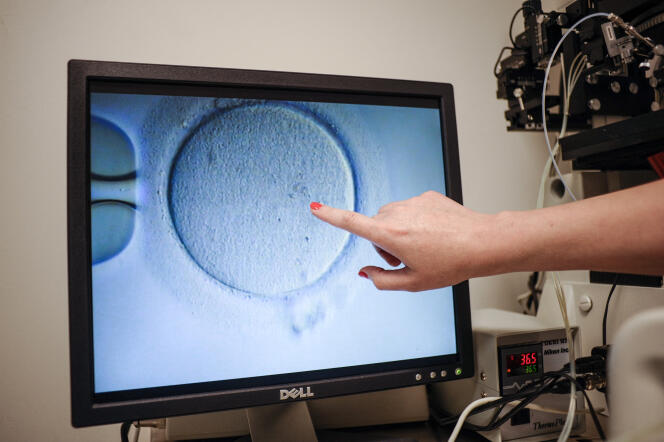Freezing eggs: new right, but very long delays


At each appointment, Dr. Matilda Bourdon takes a white sheet of paper and starts drawing. Fallopian tubes, vagina, uterus… “You see, there are ovaries, there are follicles. Stimulation of the ovaries will contribute to their development, so that during the puncture we can collect the maximum number of eggs…”– explains the gynecologist and illustrates his words every time. On this Friday in March, in the reproductive medicine department of the Cochin Port-Royal Hospital (Assistance Publique-Hôpitaux de Paris), Flora D., sitting across the table, watches and listens intently.
This is the 33-year-old woman’s first visit to self-storage of eggs. This technique of freezing and preserving female gametes is allowed except for medical reasons after the adoption of the latest bioethics law. Provision that entered into force 1Eh January 2022, open to women aged 29 to 37. According to the latest report from the Agency for Biomedicine (ABM), a sign of strong social demand, 11,500 women requested their first appointment in this context in 2022. In total, almost 4,800 first consultations were held and 1,778 women had their first puncture, ABM clarifies.
“After the Bioethics Act, we are facing a complete paradigm shift, now for women, with the possibility of self-care on a non-medical basis, also reimbursed by social security.” Which is not the case in other countries that offer this approach, emphasizes Professor Pietro Santulli, head of reproductive medicine at Cochin Port-Royal Hospital. In 2022, one of the most requested services, 1,700 punctures were performed, including 500 for social reasons – the rest are done to preserve fertility, for example before cancer treatment, or during egg donation.
“It makes me feel safe”
During the consultation, Dr. Burdon explains to his patients the various stages of the process: the closest meetings with the midwife and then the biologist, stimulation of the ovaries for ten to fifteen days, followed by the first puncture, maybe one or two more, to get the maximum. the number of eggs and thereby increase the chance of pregnancy in case of repeated use.
“Will it be local or general anesthesia? »asks Flora D. “Both are possible”– answers the doctor who insists “Her chances of having a natural pregnancy are high” In the future, and also warns him: self-preservation of eggs “Does not offer pregnancy guarantee”. For example, in Spain, where fertility preservation has existed on a social basis for several years, the gamete reuse rate does not exceed 13%. “If we recover a dozen eggs from a woman under the age of 36, there will be a 40% to 60% chance of giving birth using them.– says Dr. Burdon.
Source: Le Monde
Leave a Reply